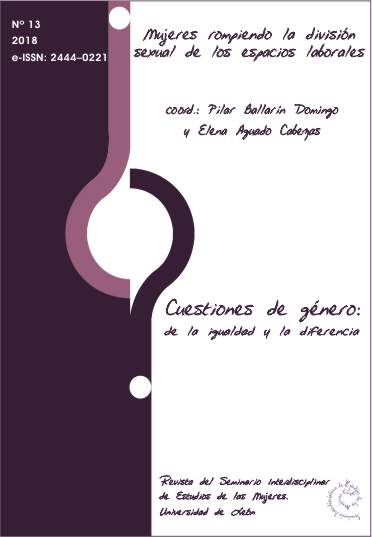“Bringing the World into the World”: Writing Poetry as Action and Challenge to Reality
DOI:
https://doi.org/10.18002/cg.v0i13.5130Keywords:
Differenza sessuale, bringing the world into the world, Adriana Cavarero, Diotima,, poetry, reality, birthAbstract
This article deals with poetry as a space for socio-symbolic praxis for the feminine subject who writes. Taking writing as “the incessant, the interminable” according to Maurice Blanchot’s words, this article analyses the concept of “corpo-reality” as a lyric strategy whereby the specific feminine experience transcends into the universality through the action of writing. This strategy implies an alteration of reality and determines an action based upon birth. This point of view, supported by the theory “bringing the world into the world” developed by the philosophical group Diotima, particularly Adriana Cavarero, establishes the need for a sexual difference perspective in order to question the parameters that have constructed the poetic tradition and have relegated women’s position to the place of atopia.
Downloads
Métricas alternativas
References
Arendt, Hannah (1958): The Human Condition. Chicago: Chicago UP.
Arendt, Hannah (2000): Rahel Varnhagen: The Life of a Jewess. Liliane Weissberg (ed.). Baltimore: John Hopkings UP.
Blanchot, Maurice (1992): El espacio literario. Barcelona: Paidós.
Blanchot, Maurice (2005): El libro por venir. Madrid: Editorial Trotta.
Bono, Paola y Sandra Kemp (1991): Italian Feminist Thought: A Reader. Oxford: Basil Blackwell.
Butler, Judith (1990): Gender Trouble: Feminism and the Subversion of Identity London: Routledge.
Cavarero, Adriana (1991): “The Need for a Sexed Thought”. En: Paola Bono y Sandra Kemp (eds.): Italian Feminist Thought: A Reader. Oxford: Basil Blackwell, pp. 181-85.
Cavarero, Adriana (1996): “Decir el nacimiento”. En Diotima, Traer al mundo el mundo: Objeto y objetividad a la luz de la diferencia sexual, tr. Maria Milagros Rivera Garretas. Madrid: Icaria, pp. 115-46.
Cavarero, Adriana (2005): “Sing to Me, O Muse”. En: For More than One Voice. Toward a Philosophy of Vocal Expression, tr. e intr. Paul A. Kottman. Stanford: Stanford UP, pp. 95-102.
Cixous, Hélène (1976): “The Laugh of Medusa”. En: Signs, vol. 1, nº. 4, pp. 875-893.
De Beauvoir, Simone (1988): The Second Sex. London: Pan Books.
Diotima (1987): Il pensiero della differenza sessuale. Milan: La Tartaruga.
Diotima (1989): Mettere al mondo il mondo: Oggetto e oggetività alla luce della differenza sessuale. Milan: La Tartaruga.
Diotima (1992): Il cielo stellato dentro di noi. Milan: La Tartaruga.
Diotima (1995): Oltre uguaglianza. Le radici femminili dell” autorità. Napoli: Liguori.
Diotima (1996): Traer al mundo el mundo: Objeto y objetividad a la luz de la diferencia sexual, tr. Maria Milagros Rivera Garretas. Madrid: Icaria.
Griffin, Susan (1978): Women and Nature. The Roaring Inside Her. Berkeley: Counterpoint.
Irigaray, Luce (1985): “Plato´s Hystera”. En: Speculum of the Other Woman, tr. Gillian C. Gill. Ithaca, New York: Cornell UP, pp. 243-353.
Irigaray, Luce (1989): Il tempo della differenza. Diritti e doveri civil per i sessi. Per una rivoluzione pacifica. Roma: Editori Riuniti.
Irigaray, Luce (1994): Thinking the Difference: For a Peaceful Revolution, tr. Karin Montin. London: Athlone.
Rich, Adrienne (1976): Of Woman Born: Motherhood as Experience and Institution. New York: Norton.
Rivera Garretas, María Milagros (2003): “Historia de una relación sin fin: la influencia en España del pensamiento italiano de la diferencia sexual (1987-2002)”. En: DUODA, nº. 24, pp.19-37.
Showalter, Elaine (1982): “Feminist Criticism in the Wilderness”. En: Critical Inquiry, nº. 2, pp. 79-88.
Woolf, Virginia (1966): “Women and Fiction”. En: Virginia Woolf: Collected Essays Vol. II. London: The Hogarth Press, pp. 141-48.
Woolf, Virginia (1994): A Room of One´s Own, London: Flamingo.
Zambrano, María (1997): Delirio y destino. Madrid: Editorial Universitaria Ramón Areces.
Zambrano, María (2016): Hacia un saber sobre el alma. Madrid: Alianza.
Downloads
Published
How to Cite
Issue
Section
License
Copyright (c) 2018 Noelia Diaz Vicedo

This work is licensed under a Creative Commons Attribution-NonCommercial-ShareAlike 4.0 International License.
L@s autores/as que publican en esta revista están de acuerdo con los siguientes términos:
1. L@s autores/as ceden de forma no exclusiva los derechos de explotación (reproducción, distribución, comunicación pública, transformación) a la Universidad de León, por lo que pueden establecer, por separado, acuerdos adicionales para la distribución no exclusiva de la versión de la obra publicada en la revista (por ejemplo, alojarlo en un repositorio institucional o publicarlo en un libro), con un reconocimiento de su publicación inicial en esta revista.
2. Este trabajo se encuentra bajo la Creative Commons Attribution-NonCommercial-ShareAlike 4.0 International License. Puede consultarse desde aquí la versión informativa y el texto legal de la licencia.
3. Se permite y se anima a l@s autores/as a difundir electrónicamente las versiones pre-print (versión antes de ser evaluada) y/o post-print (versión evaluada y aceptada para su publicación) de sus obras antes de su publicación, ya que favorece su circulación y difusión más temprana y con ello un posible aumento en su citación y alcance entre la comunidad académica.
Cuestiones de Género utiliza exclusivamente la licencia Atribución-NoComercial-CompartirIgual 4.0 Internacional (CC BY- NC-SA 4.0).
Bajo los siguientes términos:
- Atribución: Usted debe dar crédito de manera adecuada , brindar un enlace a la licencia, e indicar si se han realizado cambios . Puede hacerlo en cualquier forma razonable, pero no de forma tal que sugiera que usted o su uso tienen el apoyo de la licenciante.
- No Comercial: Usted no puede hacer uso del material con propósitos comerciales .
- Compartir Igual: Si remezcla, transforma o crea a partir del material, debe distribuir su contribución bajo la la misma licencia del original. cualquier uso permitido por la licencia.
No hay restricciones adicionales — No puede aplicar términos legales ni medidas tecnológicas que restrinjan legalmente a otras a hacer
L@s autores/as pueden consultar los derechos de copyright y las condiciones de autoarchivo en el directorio Dulcinea.











